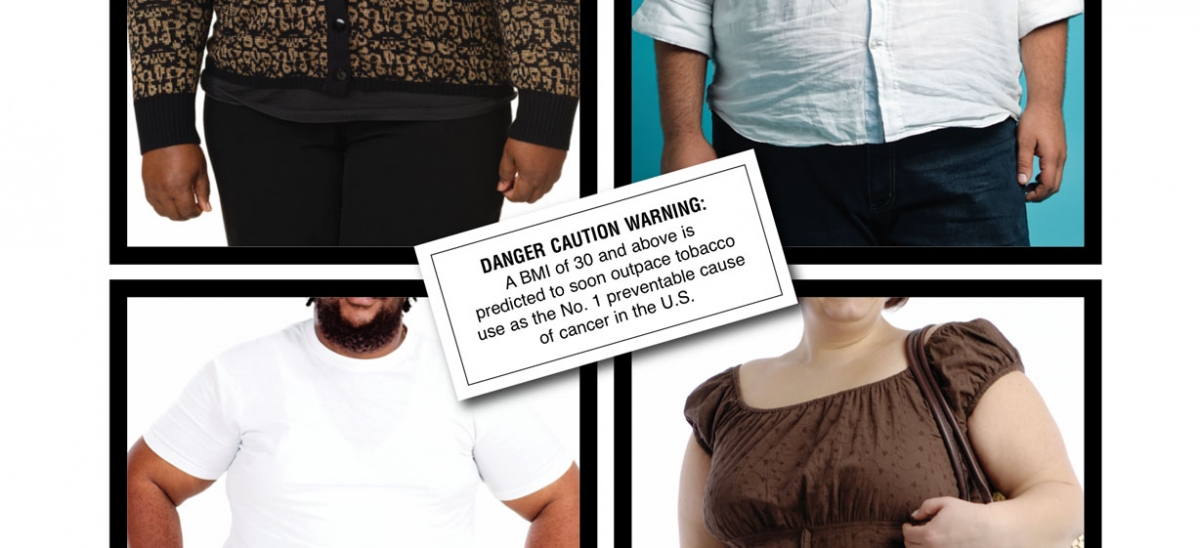Is Being Overweight the New Smoking?

Since hitting puberty four decades ago, Claudia Pianko has struggled with her weight. “When I was in 6th grade, I was 144 pounds,” she says. By last January, the 5’ 8’’ Greensburg woman weighed in at 385 pounds.
Not surprisingly, Pianko, now 54, has a slew of weight-related health problems: high blood pressure, diabetes, knee joints that are bone on bone. By 2009, she had to give up a nursing career and go on disability. When she reached a BMI (body mass index) of 52, she knew she had to do something, partly because she worried a cancer diagnosis could be her next health battle.
“I was really getting scared. My risk of cancer is already high because of a family history of cancer [mother, brother, sister and two aunts] so I decided I needed to start taking control of things that I can control. And weight is one of them.”
A BMI of 30 and above (considered to be obese and just 30 extra pounds for the average woman who is 5’ 4”) is predicted to soon outpace tobacco use as the No. 1 preventable cause of cancer in the U.S. Pianko is not alone in her struggle with weight but is unusual for recognizing it as a risk factor for cancer.
“If you ask anyone about lung cancer, they know well that smoking increases your risk. But if you ask someone about obesity, they wouldn’t usually associate it with cancer,” notes registered dietitian Edith Nault of Excela Health’s Well-Being Center.
“It’s not well appreciated that obesity is a major cancer-risk condition,” adds Dr. Robert Edwards, a female cancer specialist at Magee-Womens Hospital of UPMC. “And as our population presents obese at a younger age, it’s extremely concerning for what the long-term implications of that will be.”
Women more at risk
The list of weight-related cancers from the National Cancer Institute (NCI) includes postmenopausal breast cancer, endometrial (uterine lining) cancer, colorectal cancer, esophageal cancer, kidney cancer and pancreatic cancer. Being overweight or obese also raises the risk of dying from cancer—more so for women. An estimated 20 percent of all cancer deaths in women (14 percent in men) could be blamed on excess weight, according to an often-cited paper published in 2003 in the New England Journal of Medicine.
Somewhat astounding, 40 percent of all endometrial cancers are related to obesity, according to the NCI. As a gynecology surgeon for Allegheny Health Network, Dr. Fredric Price has seen many young women with this type of cancer. But, he adds, it’s typically not a lethal cancer so “many times, the cancer they have is problem number seven. Really, obesity is problem number one… Overweight is considered to be the new normal. I rarely have a patient whose BMI is under 30.”
How Fat Fuels Cancer
Our bodies, especially women’s, are designed to easily store unspent fuel as fat deposits, explains UPMC’s Dr. Edwards. In ancient times, when we dealt with periods of deprivation, this propensity gave women an edge up on carrying and delivering a healthy baby.
But fat tissue is not just a repository for excess calories; it creates the perfect environment for cancer cell growth. Adipose (fat storage) tissue is highly metabolically active and pumps out an astounding array of hormones, growth factors and signaling molecules, according to the NCI. Most, if not all, of the molecules being studied as potential mediators between obesity and cancer are not cancer-causing but rather cancer-promoting: They don’t cause the mutations that turn a normal cell into a cancerous one but feed the growth and proliferation of malignant cells.
The higher a woman’s body-fat composition, the higher the levels of long-acting estrogens expressed in her body, explains Edwards. “Body fat is also pro-inflammatory. It’s not understood why this happens but some of my colleagues have found the same type of chronic inflamed state with smoking.”
Other research shows that weight-loss (bariatric) surgery, which often helps a woman lose and keep off as much as 100 pounds, can reverse precancerous conditions in the uterus lining.
Small Changes Make a Difference
Pianko lost more than 100 pounds in 2015 without having to resort to weight-loss surgery. She credits regular exercise and her Excela Health dietitian, Nault, for helping her make changes that finally made a dent. Pianko is still considered to be obese but her BMI is now in the low 40s. After Nault had her write down everything she ate, Pianko realized her diet was heavy in carbs and her frequent dining out meant large portion sizes.
Fat tissue is not just a repository for excess calories; it creates the perfect environment for cancer cell growth.
Nault encouraged her not to give up dining out—which is Pianko’s main social outlet as someone who lives alone—but instead make simple changes. “I go to the same place to eat out but now I eat two pieces of pizza and take two pieces home instead of eating the whole pie.”
Pianko no longer skips breakfast and makes sure she fills up on protein throughout the day. Her sweets come almost exclusively from fruit. To be successful at long-term weight loss, Pianko says, you have to have a good support system and “You have to want to do it for yourself.”
While there are many theories about what is driving the obesity epidemic, Dr. Price of AHN blames an abundance of added sugar in the American diet. “Sugar is the carcinogen,” he says. “Probably over time, it will be determined to be the major cause of obesity, and secondly, a cause of cancer.”
Diet and cancer: Then and Now
Since the 1960s, many ideas about diet and cancer have fallen in and out of fashion. But the most recent thinking—that obesity is a major contributor to cancer—is likely to stay. Few have looked closer at the diet and cancer connection than Dr. Walter Willett, chair of the nutrition department at Harvard School of Public Health and considered to be the world’s most-cited nutritionist. “Next to whether you smoke, the number that stares up at you from the bathroom scale is the most important measure of your future health,” writes Willett in his best-selling book, “Eat, Drink, and Be Healthy: The Harvard Medical School Guide to Healthy Eating.”
Here’s a snapshot of a recent talk Dr. Willett gave at the National Cancer Institute that explores four paradigms related to diet and cancer over the past half century.
1960s
Beware of BBQ foods: Unresolved
Scientists first cautioned against carcinogens in foods when they found chemicals produced by high temperatures, such as with barbecuing, cause DNA mutations in animal models, Willett says. But he adds, “I don’t think we’ve totally resolved this question but if this was a major cause of cancer, we probably would have seen it by now.”
1980s
Low-fat diet protects against breast cancer: Debunked
“There was never any strong evidence for this idea but it was repeated so often that it became dogma in the 1980s and 1990s,” Willet says. This idea was buried after researchers followed thousands of women on low-fat diets over many years. What still holds true? While healthy fats (nuts, olive oil, avocados) are good for us, there is a positive association between animal fat and red meat consumption and risk of colon cancer.
1990s
Fruits & veggies ward off cancer: Debunked
This decade brought the widespread belief that we could dramatically reduce our cancer risk by eating five servings of produce a day. “Research shows this was overhyped,” Willett says, adding, “That’s not to say there’s no benefit from fruits and vegetables, but [the benefit is] probably very small and limited to certain foods and certain cancers. Overall, we just don’t see a relationship.”
2000s
Extra weight puts us at greater risk of cancer: True
“This paradigm, also referred to as positive energy balance, is here to stay,” Willett says. “Very clearly, there is a relationship that has been supported in dozens and dozens of studies done across many countries over the past 15 years. This paradigm is not totally new, he adds, if we look back at studies done in the 1930s, it was noted that when animals gained weight they were more likely to develop cancer. Back then, though, this finding was considered to be a nuisance rather than a starting point for scrutiny.
While today the percentage of cancers attributed to obesity and tobacco are just about equal, it’s important to remember that smoking is by far riskier to one’s health than carrying an extra 30 pounds or more. Willett notes, “On an individual basis, the cancer risk due to smoking remains substantially higher than that due to obesity.”




